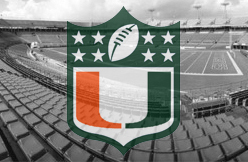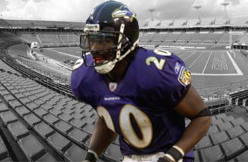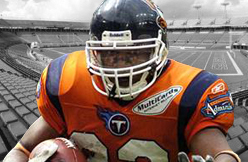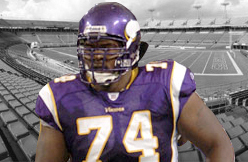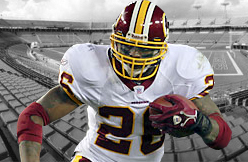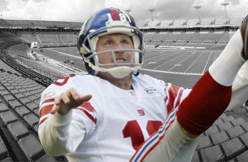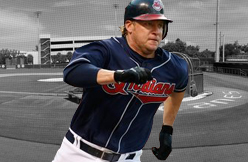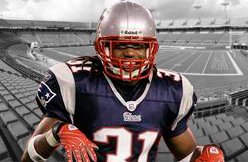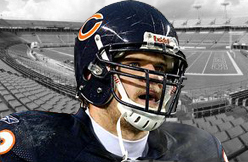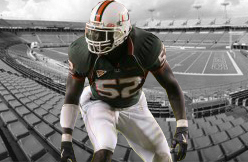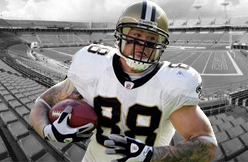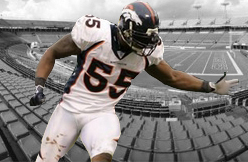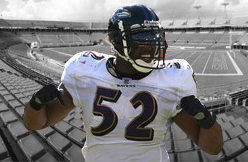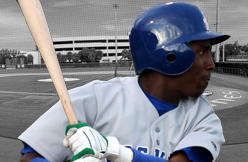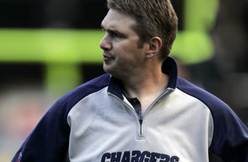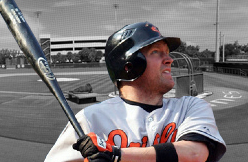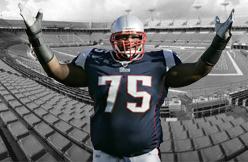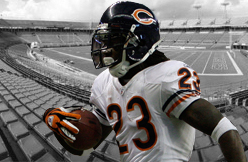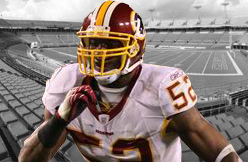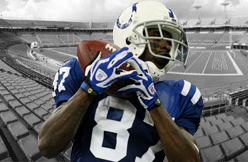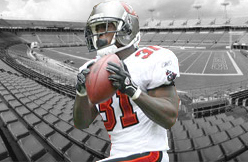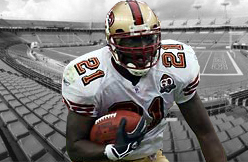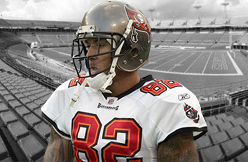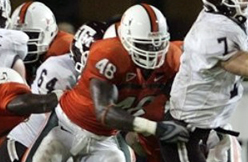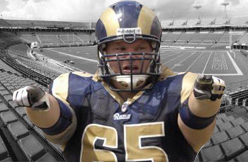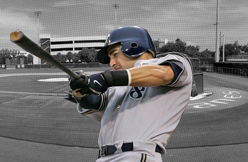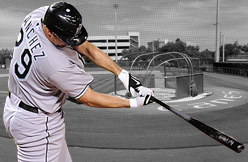
proCanes.com is continuing our “Tracking proCanes” feature with former University of Miami Hurricane, Washington Redskin, Atlanta Falcon and Miami Dolphin
Twan Russell. While attending St. Thomas Aquinas High School in Ft. Lauderdale, Florida, Twan achieved academic success and received athletic accolades. Despite having to face numerous challenges, he was named to the academic honor roll countless times. One of his proudest moments in high school was winning the State Track and Field Championship in the 300-meter hurdles. Although track and field was his first love, Twan received a scholarship to play football at the University of Miami.

Some highlights of his college football success include: leading the University of Miami Hurricanes in tackles (115), posting 20 tackles against East Carolina University, earning Second Team Big East All American honors and being named Special Teams Captain. After earning degrees in Broadcast Communications and Criminology at the University of Miami, the Washington Redskins selected Twan in the 1997 NFL Draft. During his NFL career, Twan played the linebacker position with the Redskins, the Miami Dolphins and the Atlanta Falcons.
Twan remains active in the community, making it a point to speak at functions and support causes that benefit those who are less fortunate. Through his foundation,
The Russell Life Skills and Reading Foundation, Twan provides young people with the fundamental tools essential to success. His foundation does this by emphasizing the importance of reading as a purely educational tool and as a means through which young people could experience the world beyond their immediate communities.
On Friday September 19th, The Russell Life Skills and Reading Foundation will be holding it’s
White Tie for Literacy Gala at the Seminole Hard Rock Hotel & Casino to raise even more money for the community.
To register for the Gala click here. Part I: Twan talks about his Foundation, the first four games on Miami’s schedule, Coach Erickson, Ray Lewis, Warren Sapp and much more!
proCanes: What are you doing with the Miami Dolphins now and when did you start working with them?
Twan Russell: I started with them [Miami Dolphins] about a year after I was done playing, around August 2005. I am the director of the youth and community programs. I oversee all youth initiatives from a Dolphins’ standpoint in schools. We have in-school programs, we have community center programs, we have youth football programs with the primary focus of teaching football and educating kids. We have a big initiative called “Dolphit” where we say kids have to be fit in the classroom, they have to be fit physically and they have to be fit socially. The three main things are education, physical fitness and positive choices. You have to do those three things to be “Dolphit.”
pC: How many schools are you involved with?
TR: All of them. All of the schools in South Florida and right now we’re trying to expand to all eight counties which is a huge initiative. We’re doing a skeleton right now. It [the initiative] is coming from our owner, it’s coming from our CEO. They don’t just want to be the Dade, Broward and Palm Beach Dolphins they want to be the South Florida Dolphins. It is kind of cool because it expands what I do and expands our message, which is what it’s all about anyway.
pC: How did you get into this? Did you get into this through your foundation? Is there overlap between the two?
TR: There is a lot of overlap because a lot of the things that I implement now I learned while building my foundation. But I guess the way I got involved, probably about a year after I was finished playing I got a phone call and was asked if I would be interested in working for the Dolphins from Bryan Wiedmeier, at the time he was the COO of the Dolphins. He asked me if I would be interested in working there, so I went in and it was a cool meeting because he asked me ‘what would you like to do?’ and I said I want to do this, this and that and he said ‘OK great, if you can those and also do this, we would love to have you.’ It was a cool interview because it was more about this is what we kind of want to accomplish and we’re looking for somebody to go out and accomplish that for us. It was fun because it kind of fit who I am and what I want to do.
pC: Let’s talk a little about your foundation. When did you start it and talk a little about the mission.
TR: I could talk about the foundation for days, but we actually started in 1998 but we didn’t incorporate until 1999. My mom and I were sitting in the house one day and I told my mom “I would really like to do something in the community, I would really like to start a foundation and I want to do it around educating kids.” She says: ‘That’s exactly what I want to do, you’re taking the words out of my mouth.’ So we sat down and put a plan together and originally we were just a homework program. Let’s just help kids with their homework. Within that first year we learned very quickly that the reason children aren’t doing well in their class work or homework had nothing to do with desire, it had to do with ability. So we said let’s focus on the problem. We took a different focus and said let’s focus on literacy. Let’s teach our children how to read and write and from there they can teach themselves and learn anything they want to.
People say ‘you only focus on literacy, what about math and science and the rest of the subjects?’ Well, if you can’t read you can’t do the rest of the subjects. We see a significant increase in our children once they catch up in their proficiency in reading. Now where they struggle is the word problems and FCAT questions because they mix up the sentence a little bit because the kids may get confused as to what the question is asking. The children in our program score higher in the FCAT and we don’t teach the test. The reason for that is because we take the fundamentals in reading and writing where it’s 60% phonetics and 40% whole language. We take those to philosophies and we say what does phonetics do well? Phonetics is great for understanding the origination of the word you can sound out any word you have never seen and maybe use it in everyday language either written or oral. You can sound that word out and decipher it. Then the second part of that is whole language. Whole language is if you put up an apple and the word under it is “apple,” it’s memorization. It’s great for reading ability and comprehension. They both have good qualities so let’s combine the two. Our kids read faster, comprehend better and they can read any word that’s out there, because they have the tools.
There was a study that came out a couple of years ago that you can predict with a 90% accuracy rate whether a child will be successful in high school by the time they are in third grade. Our kids go all the way up to high school but we understand that if we can get those children on par by the time they are in third grade they will have a better chance to achieve later on in life. Probably 60% of our population is that younger group, pre-k to third grade. Don’t get me wrong we have quite a few 4th and 5th graders and middle school students; we even have a teen center in Miramar. Our teachers understand that those are the critical years and we put a lot of effort in those years.
pC: Let's talk about the first four games on the Miami Hurricanes’ schedule.
TR: We have Florida State, we match up well against FSU. We have for years. Anyone can win that game and obviously you know who I'm piquing. Then we have Georgia Tech and of the first four games, I think that is the toughest one. We haven't beaten them in four years. We don't match up well with them. I remember when I played against the option. It was assignment football, you had the fullback and then you had maybe three people that had two players. The strong safety, linebacker and the end had the quarterback and the pitchman. Between the fullback, quarterback and pitchman, you slow played the quarterback to the pitch. It's hard to explain that to a young guy because a young guy trusts his ability not necessarily his mind. Now you have guys that have been in the system a couple of years and get it. The defense hasn't changed. The offense with Whipple has changed, but from a defensive standpoint we'll be OK. Of the four that's the one that makes me a little nervous. Oklahoma, I think we match up well against them. Virginia Tech is kind of like Florida State. Anybody can walk out of that game victorious. All of them can turn out that way. People say, 'oh they CAN'T win that game,' that's a bunch of crap. The University of Miami can match up against any of those guys. They play good football and have talent coming up and have some young guys that are hungry.
pC: So let’s start from the beginning. What age did you start playing , did you play any other sports?
TR: I probably started playing football at five years old and you were supposed to start when you were six. So I was not quite on the team initially, because I didn't qualify from an age standpoint. Back then the ages were different. If you were six at any point during the year, when you turned six you could play. For the most part of the year I was 5 but then I turned 6 by the middle of the year. I used to be the practice squad guy that everyone used to run over. By the end of the year I started to play a little better. I had an older brother on the team and I kind of wanted to be like him and he beat me up all the time. I think most of it was to just find ways to hit him on the field because he was a running back and by wanting to do that, I wanted to be a better player.
I played football most of my life, but my passion was track. When I was in middle school, I ran the hurdles, triple jump and long jump. When I went to high school I thought I was going to be a decathlete or Olympic hurdler. Believe it or not, when I was looking at colleges I looked at colleges that were going to let me run track. It was a good plan initially, [laughter], when you're a linebacker and weigh 180 lbs coming to college and you're still running track. I would get up to 195 pounds but then during track season I would get down to 180 lbs. It was Spring of my freshman year and I was missing spring practice because it was during the Big East [Track] Championships where I placed fourth. I come back and I'm like man, I placed fourth, I didn't even practice that much! I was all excited and I was thinking maybe I can do both. So Coach [Dennis] Erickson catches me in the hallway and he says: 'Hey Twan, come here. I heard you did really good.' He was totally setting me up. I told him “thank you coach” and he says: 'Yea you did 4th, huh?' I said “yeah I am really excited about that” and he says: 'Yea but next year you won't be running track if you want to stay on the football team.' That was the last conversation I had about track. [laughter] He was cool about it, I mean he said it jokingly but he was serious. I'm kind of glad it happened that way because then I could focus more on football and my class work. It allowed me to broaden my horizons as far as what I wanted to do. It gave me the ability during the offseason to do more internships and it kind of broadened my horizons as far as where I'm going to be working. So actually it was a blessing in disguise. He did it just for football reasons, but it actually turned out being good.
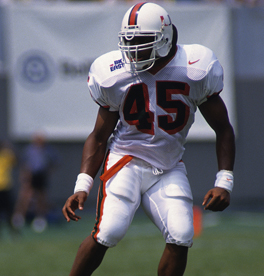
TR: I had no idea I was going to the NFL. It's funny because when I was in High school I had no idea I was going to college. I started and I knew I was an OK football player. I went to St. Thomas Aquinas. There were a bunch of us who were playing and I never really got the media attention in football. I got a little in track. I think it was maybe the beginning of my Senior year and I walk up to Coach Smith and say: "Coach, you know I need to start thinking about college, I don't think my mom can afford it" and he starts laughing and tells me 'go look in that box.' So I go look in a box with my name on it and in the box there are a million letters with my name on them. He says: 'why don't you reply back to those people and maybe one of them will give you a scholarship!' You know, I'll tell you, that was one of the best things that ever happened to me because, I didn't know. You know what I mean? Now a-days kids are being recruited as sophomores. I played because I loved to play the game. I probably played better because I wasn't worried about stats. I played because I loved the coach, I loved my teammates. I just loved the game. After that, I was like OK! I started getting phone calls and Randy Shannon was one of them.
pC: Randy Shannon actually recruited you?
TR: Well he wasn't the first, Erickson's offensive coordinator recruited me initially but then Randy did. At first, I wasn't sure if I wanted to go to the University of Miami. For me, I didn't just want to pick a school because I wanted to play there. My mom was pushing me to go to Notre Dame.
pC: Who was it down to in the end?
TR: It came down to Notre Dame and the University of Miami. Florida State was in there for a little while, until I went on my visit. [Laughter] It just wasn't for me. I narrowed my schools down by thinking number one, of all the schools which ones could I play for? Actually early on Michigan was number one on my list until they told me they wanted to move me to strong safety. Then I narrowed it down to Notre Dame, FSU and the University of Miami. Those were my top three. They all had good communications programs because I thought I wanted to be a broadcaster. Syracuse was high on my list because they had the best broadcasting program, but from a football standpoint I couldn't see myself playing there. Between Notre Dame and Miami, Miami won out from a weather standpoint and everything about the University of Miami, fun in the sun, on top of the fact that I knew I was going to get a great education. I was going be close to home and I had a great rapport with the coaching staff. I love Coach Erickson. I knew them from when my dad worked there.
pC: I was going to say you had a connection to the program.
TR: When I was in 8th grade and Coach Erickson had never seen me play football he told me 'one of these days , you're going to be looking for a college and I hope it's the University of Miami.' It was kind of a joke, but when it started coming down to it, and I don't know if he remembered making those comments, but it meant something to me that he knew my name. Whether he asked somebody or whatever, when he walked in a said 'hey Twan, how you doing?' I felt a sense of pride that the head football coach of Miami knows my name. Who sealed the deal was probably Randy [Shannon]. We developed a relationship and he truly cared about me as a person. He didn't just give me the crap talk. He was real with me. He said 'you're going to come in and sit on the bench and play special teams for a few years. I've got Darrin Smith, Michael Barrow.' So he was real, and I appreciate that. He didn't give me any crap. At the time the defensive coordinator was Sonny Lubick. I liked them all. I liked Sonny and Randy and I knew when I went there I was going to be among the family. I knew they were going to show me tough love and I needed it. I knew they were going to help me when I needed it. Actually that was the best decision I ever made because that's what it was. There were times when I needed to get slapped in the head and they did it, not literally. Maybe I was out running five o’clock in the morning. There were times when I needed a pat on the shoulder and they did it. There were times when I needed to be pushed and they did it. That is all you can ask from a program and I think that is one of the reasons why they were so good at what they did. They understood the person. It was more than just football.
pC: What do you think was toughest part about playing at UM?
TR: Probably the whole thing with my father before I got there. That was tough
pC: Did you get a lot crap from players or looked upon weirdly.
TR: Probably most of it came from me because I knew it was there. That was probably the biggest single reason of why I didn't want to go to the University of Miami. I didn't want to deal with it. I remember having that conversation with Randy and he said: 'Twan, we're not recruiting because you're anybody's son, we're recruiting you because you're a man that we want here and we think you can help us.' That went a long way because a lot of people were saying 'why would you want to go there after what happened?' But, that was the best decision I ever made. The things that I dealt with because of that. My first year, I don't know if I wasn't at the University of Miami if I could have handled it if I didn't have the support. I'm not talking about someone holding my hand, I'm just talking about people who cared about me and protected me and said 'hey Twan, today you need to address this and leave it alone.' It made me tougher physically and mentally to be able to deal with those situations. Even now as an adult, you deal with all sorts of crap, but if I can deal with that, I can deal with anything.

Probably the worst time I ever had was probably my redshirt sophomore year and we were at Temple I think or West Virginia. They start chanting 'Pell Grant' and other things and I'm in the middle of the game. I'm a special teams player so I have a lot of time to be on the sidelines. [Laughter] I'm a 19-year-old kid, and this one guy is just killing me. My teammates kept telling me not to worry about it and then they started to make it personal and said my dad's name and I lost it. I don’t remember who tackled me because I am trying to hop the fence and get the person, because I just lost it. I look at it now and think, wow that was crazy but I didn't even realize what I was doing at the time and my teammates pulled me back and told me not to worry about it. It's things like that, if I was somewhere else, I don't know if the coaching staff or the players on the team would care enough to help me through that and they wouldn't have understood. It's because of those things I am who I am right now.
pC: How would you say Erickson was as a coach?
TR: I loved the guy. I loved him. I loved him. I thought he was a great coach. He was one of the main reasons I went to Miami. He cared about his players and he probably did it to his fault but he cared about the guys. A guy cannot say coach Erickson did not care about him or did not try and take care of him. He did it to a level that most people wouldn't understand. I love him. There is a critical moment in every athlete’s life, where you rise to excellence or stay mediocre. What he did through everything, he made sure he gave you every possibility to rise to excellence. I remember those locker room talks and those one-on-one's he had. Before he left, I was a young guy. I wasn't contributing to the level of the Michael Barrows or Darrin Smiths, but he still had time for me. He would pull me to the side ,ask how everything was going. He would say: 'hey, you know Spring is coming up and I will be watching you to see what you can do.' He talked to guys on that level. Since I have been in the NFL and other places, I never had a coach that did that outside of my position coach. I never had a coach pull the guys to the side and you're the obsolete guy and say: 'hey I'm looking at you now and waiting for you to do something because I see it in you.' That doesn't happen. For me, I thought he was great. I loved him.
pC: You were there after he left. Did you notice a huge difference between Coach Erickson and Coach Butch Davis.
TR: Yeah, it was a different coaching staff. Completely different coaching styles. Erickson was a little looser, but Butch came to town when he had to crack the whip a little bit. That doesn't make him any better than Erickson, we needed a different type of coach and a different type of person for that time. We were going through all of the probation stuff, but you know he was the perfect coach for that time and I bet if we had a different coach at that time we wouldn't have come out of it that successful. He came in seeing that he had some players on his team that he needed to take care of but he still had to build for the future, knowing he didn't have all the resources to do it. Some people didn't understand what he was trying to accomplish but when you look at the long-term picture there were some things he needed to change whether you like it or not. If you watched him later on, it worked out. You can't get mad at a man for his plan. He was a good coach and we had a good friendship. He even brought me up to Cleveland and I flipped a coin. I was close to going but for me it was important to stay home and be with my family.
pC: It was between the Dolphins and Browns?
TR: Well I was with the Dolphins and I was a free-agent and the Browns brought me up and he was serious. From the moment I stepped off he was very serious about his offer, but for me it was more than just that. I really thought down here, I could make a mark in South Florida not just on the football field, but off it, and that always played into my decision and it turned out to be a good decision.
pC: How was it playing next to Ray Lewis?
TR: It was fun. We just played the game. We just had fun. Football is so much less complicated than people make it. We knew what the coverages were, we only called three or four defenses back then. Sometimes we would put stuff in and then so often I would hear Randy say, 'screw that, we're going to do what we do' and he would throw it all out the window. [Laughter] Coach Tubberville would say 'screw what we learned all week, Cover A Cover 2 and we're going to line up and kick their butt.' That's the way we played. We would make jokes on the field. It was fun and we were intense, but we wouldn't take life too seriously.
pC: Was he the leader of that defense at the time?
TR: We had Warren Sapp, we had a lot of guys on that team. We had CJ Richardson, we had a lot of leaders on that team. At that time I wouldn't say he was the leader of that defense. He left with Warren and Warren was a big personality back then.
How was it playing with Warren?
Warren is crazy. It's a good crazy though. A great teammate, fun to be around. You talk about somebody who would keep you on the edge, the things that he would say you wouldn't even think. He knew football, he knew the game, he was brilliant. When it came to X's and O's I always thought he was very smart.
pC: Who was the best player you played with at UM, or the toughest to go up against in practice.
TR: It's not just one! It's hard! I came in my freshman year, I remember it was during Spring and the young guys do practice squad and all that stuff. It was a four-wide set and they have Kevin Williams in the slot and I'm the linebacker so I have to bump out Kevin. I remember covering him and the quarterback didn't throw the ball to him and I remember telling him "I D'd you up Kevin" and he says 'you didn't D me up, the quarterback just didn't see that I was open.' [Laughter] I was sitting there thinking that these are the guys that I would watch on television. You know, Darrin Smith, Michael Barrow, Jessie Armstead. To be in the meeting room with them and see how they break down film, see how they communicate on the sideline and even off the field and see how they help the young guys be successful. All that for me was a big deal. It's hard to say who was the best. You had Ryan McNeil and then you start talking receivers with Lamar Thomas, Horace Copeland, running back, it just never stopped.
So who was the best player? Maybe me? [Laughter] That's the joke at the University of Miami, everyone asks who the best player is, and everyone looks in the mirror! [Laughter] I don't know. Even Ray [Lewis] he was a good College Football player but he is a GREAT NFL player. Ray in college was good, everything he did was good, but what he is doing in the NFL is CRAZY. Very few guys can raise their level by 100% when they go to the next level. Most guys can go up 20 to 30 percent, but he increased it 100%. You can't compare the college guy to the NFL guy. They are two different people. To answer your question, I don't know. Do you throw Gino there? You have Kevin Patrick, it just doesn't stop. I can do it by position!
pC: Give me the best receiver at the time and bets linebacker.
TR: Receiver is tough, it was “Fast Track Football” back then. It becomes a coin toss between Kevin Williams, Horace Copeland, Lamar Thomas. Probably of the three, the most exciting because he talked a lot was probably Lamar. Horace always had the huge catches and flips in the end zone and Kevin Williams was a great kick returner but he was great in the slot. It's hard to find those slot guys. Think about how many games he scored on a punt return, running the ball catching the ball.
Linebacker is easier for me. See my all-time favorite linebacker is probably Darrin Smith. That doesn't take anything away from Mike and Jessie, but you know Darrin was a head guy. He wasn't the biggest guy in the world, but he was smart, savvy and tough when he needed to be.
pC: Didn't you take his number when he left?
TR: Well, he took my number before I got there. [Laughter] Well I was 45 in High School and when I got there I had to get 54 so I was waiting to kick him out. He was one of the reasons why I went. On my visit I spent a lot of time with Darrin and Michael Barrow. Those two guys are two of the reasons why I went. Hey, if they can do it and they're from the same area and kind of my build out of high school, I can do this as well.
Click here to read Part II of our interview with Twan and see what he has to say about his recruiting experience, the Washington game, the NFL draft and more!



